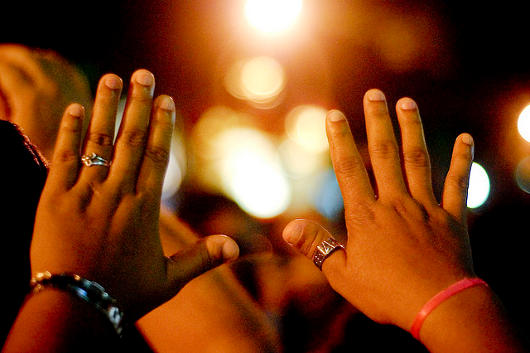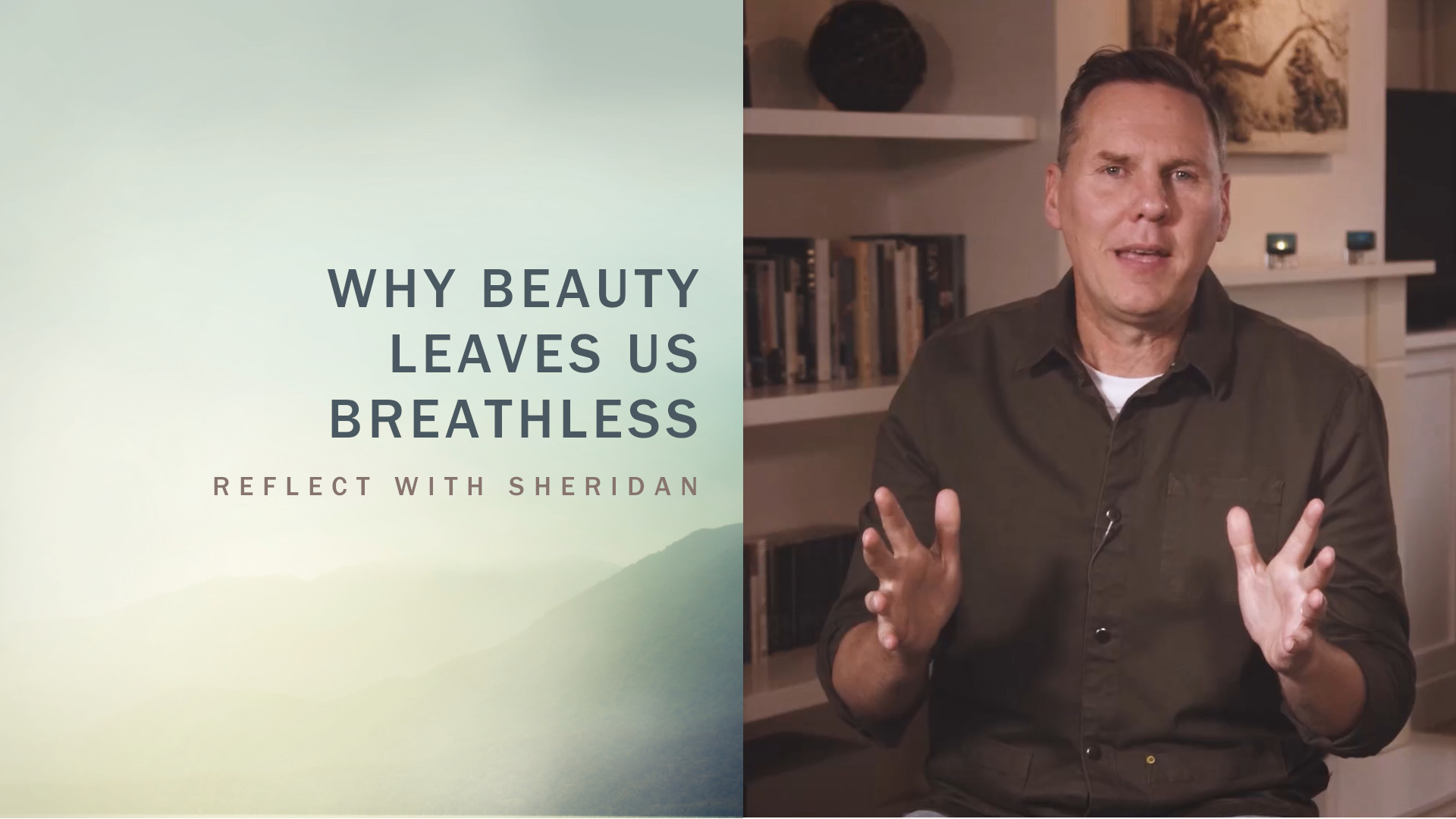Everyone Has a God. Here’s How to Discover Yours
Picture: Breno Peck
Note: This a More Than This-related post. Comments left here qualify you for the book competition.
Worship is a universal phenomenon. Anthropologists tell us it’s found in some form in every culture. It seems that we all have a longing to place something or someone as a supreme authority or meaning-giver in our lives.
To put it simply, everyone has a God. Even if we’re ‘not religious’.
So who (or what) do you really worship? This article might help you find out.
Surrogate Gods
In his fascinating book Modes of Faith: Secular Surrogates for Lost Religious Belief, Harvard literary scholar Theodore Ziolkowski reviews the lives of prominent British and European writers of the nineteenth and early twentieth centuries. Each author and poet he chose to study had lost his faith in God, and Ziolkowski was keen to discover the outcome. By reviewing the stories, poems, journals and memoirs of these writers, what Ziolkowski found was this: while the Christian God of the authors’ childhoods had been abandoned, another ‘god’ had taken his place.
Ziolkowski found five ‘faith surrogates’ to be most attractive to these men, and indeed to many Europeans around them:
- Art: For Friedrich Nietzsche, Oscar Wilde, James Joyce and others, art was raised to god-like status. These men hoped that the epiphanies of art would provide a powerful religious substitute to the faith they had dismissed.
- Pilgrimage: For others like EM Forster and Herman Hesse, the new way was hoped to be found in exotic pilgrimage, particularly pilgrimages to India. As these disillusioned writers criss-crossed the Indian continent looking for their hoped-for paradise, their memoirs became best-sellers, fuelling similar sentiments back home.
- Politics: Thomas Mann described the age at the end of World War I as ‘a free-floating faith looking for an object,’ and Socialism and Communism soon became the objects this faith was looking for. Marxist Communism became a ‘quasi-religious faith’ according to Ziolkowski. With what we now know of history, he understandably calls this surrogate faith ‘the god that failed’.
- Myth: Fourthly, a hunger for myth developed—a story that could help people understand their place in the universe and the meaning of their lives. ‘The nineteenth century knew of no myth for which to feel reverence,’ Ziolkowski writes. Sadly, this state of affairs proved to be fertile ground for Nazism. The results were, of course, devastating.
- Utopia: Finally, when the promises of art faded, when pilgrimage lost its lustre, and when socialism and fascism tragically failed, many turned their religious hopes to another faith-surrogate: utopia. Writers like HG Wells turned their creative skills to crafting alternative visions of the future, building on the hope that we could progress towards a more meaningful world in this life.
Here’s the interesting thing: these writers hadn’t suddenly believed in nothing upon their loss of faith. They had needed a ‘surrogate faith’ to fill the spiritual vacuum left in God’s absence.
Modern Gods
‘If you leave people alone,’ The Economist editor John Micklethwaite once said to me in an interview, ‘on the whole they will want some kind of religion. Man is a theotropic creature.’ As Australian social researcher Hugh Mackay put it in What Makes Us Tick? ‘Even the most sceptical of us find we have to resist the desire to believe, as if we are believers by nature.’
Believers by nature.
There is a religious impulse within humans that compels us towards belief in Something beyond. An unseen power. A creator. A God. The question seems to be, not if you believe in God, but which god you believe in.
For the literary lights of yesteryear alternative gods included art, politics and dreamy utopias. What modern gods might lie at the centre of our hearts today?
Our ‘god’ is that thing, person or idea that gives us meaning, security and identity. As Tim Keller puts it, our god is ‘anything so central and essential to your life that, should you lose it, your life would feel hardly worth living.’ The contenders therefore are legion:
- Success
- Status
- Career
- Money
- Popularity
- Physical beauty
- Academic recognition
- Power
- Fame
- Sex
- Family
- Children
- As Pete Ward has shown, celebrities can function as gods for us.
- Keller even suggests that Christians can treat doctrine, spiritual gifts and morality as gods.
‘Whether it’s a supernatural being, a mysterious life-force… science, money, wisdom, information, ritual, power or love,’ Hugh Mackay notes, ‘most of us assign the status of ‘god’ to something in our lives.’ When ‘secular’ voices like Mackay say such things, it’s worth taking notice.
But… why?
So, worship is found in every culture, all of us assign the status of ‘god’ to something in our lives, and even those who abandon faith need a faith substitute.
But… why? Why do we have this religious impulse in the first place?
Here’s where I’m convinced the biblical record can help us understand things. If we really are made in the image of a good, loving and personal God (Genesis 1:26-31), and made to be in relationship with this God as we live, love and work; and if it’s true that wandering away from this God really does bring spiritual and emotional (and even physical) death (Genesis 3, Romans 1:20-25), then that religious impulse is a heart-cry to find the true Satisfier of our souls.
And, if we’ve been given eternity-sized hearts as a meeting place for this infinite God, then any attempt to replace him with a finite thing, person or idea will ultimately leave us wanting. Lesser gods always disapoint, if not now then somewhere down the road. They can’t bear the God-sized weight we put on them.
Ziolkowski finishes his book by reflecting on the God-substitutes of yesteryear’s literati. ‘[In] the final analysis,’ he concludes, ‘all the surrogates turned out to be inadequate.’ And today’s secularised society, he warns, ‘especially in Europe but also among many rootless Americans, finds itself in a situation remarkably similar to that of almost a century ago… the problematic reality of a world still disenchanted and of lives still unfulfilled.’
‘You shall have no other gods before me,’ says God in the famous Ten Commandments (Exodus 20:3). Perhaps that’s not just because this God is worth ultimate allegiance, but because any other god will ultimately break our hearts.
Smoking Out Our Hidden Deities
Who or what we worship, then, is of immense importance. So, who or what do you really worship? Here are some questions to help you reveal your heart’s hidden deities:
- What do you daydream about? What preoccupies your thoughts? To what does your mind naturally gravitate as you wait for the bus?
- What is your greatest nightmare? This is a revealing question Tim Keller suggests we ask ourselves. If something were to happen that questioned your very reason to live, your god has probably just been revealed.
- In what way do you most envy others? Is there a theme developing yet?
- When are you prone to emotional outbursts? What is at stake when you blow up or curl up inside?
- What do you most desire? What is the one thing you think would give your life meaning or value?
- On what do you spend time or money easily? Or putting it another way, to what are you most easily addicted? What might lie at the bottom of that addiction?
- Ultimately, what are you building your happiness on? What lies at the centre of your life?
‘I have come that they may have life, and have it to the full,’ stated the world’s true God when he visited the planet in human form (John 10:10).
The desire of our heart has a true fulfilment.
***
Q: What do you think are today’s most popular ‘gods’? Be honest now – which one are you most prone to worshipping?






Sheridan Voysey
I’ll start. Judging by my workload and anxieties about projects, I do wonder whether ‘work’ is a god that challenges God for my own heart.
So, does ‘repentance’ for me mean a holday? 🙂
Sm Oram
Most of my conscious life has been spent running from my paternal heritage. The shame permeates all of my relationships but, presently, is of particular relevance in my relationship with my 12 year old son as he struggles through his first year in high school. I have come to see how I have made it a life goal to never be anything that even slightly resembles my father and his extended family. It is a god that I have spent far too much energy investing in. It is killing my relationship with my son and yet, to repent feels like death.
Sheridan Voysey
It sounds like you’ve made a profound discovery, Sm. What will you lose by giving up this ‘god’? Why does the thought of repentance feel like death?
Achampn
what if the surrogate turns out to be better than the original at providing meaning, security and identity?
Sheridan Voysey
That’s a good question. Based on the research I’m doing, drawing from mainly secular authors like Ziolkowski above, the general thought is that such surrogates are *not* working. In time they are failing to fulfil us.
But at an individual personal level I’m sure a surrogate god or faith can satisfy for a time. But in the long term?
I’d also be keen to look at the ‘original’ God that was replaced. Plenty of us have had to abandon the distorted images of God we were originally given. And there are plenty of distortions about. 🙂
Titus
Atheism is a religion. It’s just a fact. A funny trend on Christian Discussion Forums, among the resident Atheists (Why are they there? Go figure.) is that Atheism is in no way a religion. They are passionate (zealous?) about this and get up in arms when confronted with the accusation that they have a religion. A religion is a belief system in its most basic definition. They will fight tooth and nail to deny that their religious status of Atheism is absolutely not a belief system. They claim it is not a disbelief in gods nor a denial of gods but the lack of belief in gods.
What they can’t seem to justify, or reconcile, is that they must have knowledge of a concept in order to lack belief in it. Atheism is then a choice, it is a lifestyle, it is a belief system. They have made the conscious decision that they do not believe in gods. That is a belief system no matter how you slice it.
Just as modern science is a religion for so many today, Atheism is a religion in its most basic sense. Atheists embrace any one of the above mentioned gods. Everybody has a god.